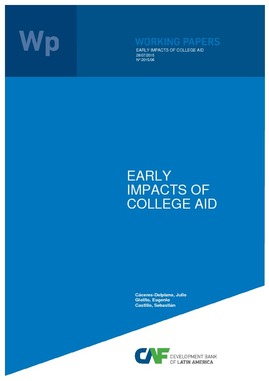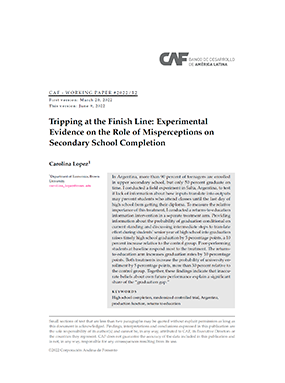| dc.contributor.author | Estrada, Ricardo | |
| dc.contributor.author | Hatrick, Agustina | |
| dc.contributor.author | Llambi, Cecilia | |
| dc.coverage.spatial | América Latina y el Caribe | es_ES |
| dc.coverage.spatial | Brasil | es_ES |
| dc.date.accessioned | 2022-03-18T21:25:50Z | |
| dc.date.available | 2022-03-18T21:25:50Z | |
| dc.date.issued | 2022-03-18 | |
| dc.identifier.citation | Estrada, R., Hatrick, A., & Llambi, C. (2022, March 18). What a difference a full day makes: Evidence from new schools in Fortaleza. Caracas: CAF. Retrieved from https://scioteca.caf.com/handle/123456789/1884 | en_GB |
| dc.identifier.uri | https://scioteca.caf.com/handle/123456789/1884 | |
| dc.description.tableofcontents | Although longer school days are in increasing supply, a lack of consensus about their effectiveness persists. Motivated by this gap, this paper studies the effect of enrolling in a new set of full-time secondary schools in the city of Fortaleza, Brazil. For identification, enrollment is instrumented with the distance from the student’s graduating primary school to the closest fulltime school in operation at that time. The results show that enrollment in a full-time school increases lower-secondary-school graduation by 11 percentage points and math test scores by 0.22 standard deviations. These findings highlight the potential of full-time schools to significantly improve student outcomes. | es_ES |
| dc.language.iso | en | es_ES |
| dc.publisher | CAF | es_ES |
| dc.subject | Desarrollo | es_ES |
| dc.subject | Docentes | es_ES |
| dc.subject | Educación | es_ES |
| dc.subject | Estudiantes | es_ES |
| dc.subject | Investigación socioeconómica | es_ES |
| dc.subject | Políticas públicas | es_ES |
| dc.subject | Sector académico | es_ES |
| dc.title | What a difference a full day makes: Evidence from new schools in Fortaleza | es_ES |
| dc.type | workingPaper | es_ES |
| dc.publisher.city | Caracas | es_ES |




